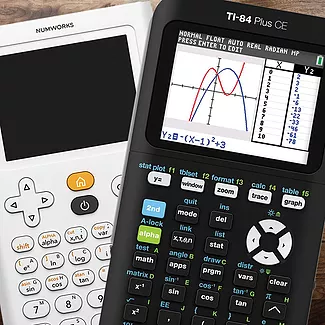When it comes to buying a graphing calculator, it is no secret that these calculators are not cheap. Many students and parents wonder what the real difference is between the available calculators and which one they should buy. Equipped with the fear of choosing the wrong calculator, many turn to comparison websites for the answer.
If you have arrived at this article, you are in good hands. Unlike most other reviewers, I have worked with students and teachers at all levels of mathematics using several graphing calculators. I will do my best to ensure that you can make an educated decision when buying your next graphing calculator.

Best for Middle/High School Classes: TI-84 Plus CE

Most teachers and students would agree that the TI-84 Plus CE calculator is by far the best option for middle and high schoolers.
Textbooks have instructions geared towards users of this calculator, teachers know how to use it, and it has the most resources/tutorials available online. You really can’t go wrong with this calculator. Every major college entrance exam accepts the use of this calculator, including the PSAT, SAT, ACT, AP Exams, and IB Exams.
But what about the TI-84 Plus/TI-84 Plus Silver Edition/TI-84 Plus C Silver Edition?
These calculators are essentially the same thing, just older models. They should work just fine for middle/high school students, but I would still recommend the newer TI-84 Plus CE. It has a higher resolution color display, has new features not found on the older models, and is faster.
Some other websites actually recommend the TI-Nspire for these level classes. This is certainly an option, but I would highly recommend not choosing this calculator. The TI-Nspire is overkill for most classes, not to mention that many teachers/standardized tests do not allow the CAS model. In my experience, the calculator is much more difficult to use and most teachers don’t know how to help. I would only recommend this calculator if it is what the teacher requests.
TI-84 Plus CE Details/Price: Amazon
Best for College Classes: TI-Nspire CX CAS II

The TI-Nspire CX II CAS features advanced functionality for students in higher levels of math in both high school and college. The interface is document-based (you can store documents and pages), and is more like a computer.
The are two main models of the TI-Nspire CX II: the CAS model (TI-Nspire CX II CAS), and the “normal” model (TI-Nspire CX II). I am recommending that you buy the CAS model (despite the slight price bump) because it allows you to manipulate expressions and equations in terms of variables. For example, if you typed (X-3)(X-6), it would return X^2−9X+18. It actually simplifies the expression, rather than just evaluating it, which would return 18 on the non-CAS model (assuming X=0). This functionality is useful for Chemistry and Physics courses.
If you are considering purchasing this calculator as a high school student, it is important to consider the fact that the CAS model is not accepted on the ACT (it is on the PSAT/SAT/AP Exams), and many high school teachers prohibit their use.
The HP Prime calculator is also another choice to consider for this category. If you are recommended one of these calculators for your classes, I would suggest following the recommendation. The main flaw of the HP-Prime is that there isn’t a large community or support for it. Texas Instruments calculators are usually the focus of textbooks and teachers are more familiar with them.
TI-Nspire Details/Price: Amazon
Best for Learning to Program: TI-84 Plus CE (or Numworks 100)

The TI-84 Plus CE is an excellent way to start learning how to program. Many professional developers can trace their beginnings back to this calculator’s TI-BASIC programming language. Additionally, it also supports C, Assembly, and ICE (a more advanced version of TI-BASIC). There is a large community of programmers behind this calculator, so there are plenty of people to help you out!
Another great option is the Numworks 100 Graphing Calculator. Numworks is a startup company that is rapidly updating its calculator to compete with Texas Instruments and other companies. Their code is completely open-source, meaning anyone can make any changes they want to the operating system. If you are not a C++ programmer (the language the OS is written in), they are very accepting of any suggestion you may have. The downfall of the Numworks is that despite it’s amazing Python and C++ functionality, it is still lacking a few key features (such as advanced statistics/probability) required for some math classes, and teachers will likely be of no help in learning how to use it. For this reason, I have to recommend the TI-84 Plus CE, at least until their software catches up (which, at this rate, will probably happen in only a couple years).
TI-84 Plus CE Details on Amazon
Summary/Comparison
Here’s a quick comparison of all the calculators mentioned in this article.

If you have any question, comments, or concerns, please do not hesitate to contact me at [email protected]!